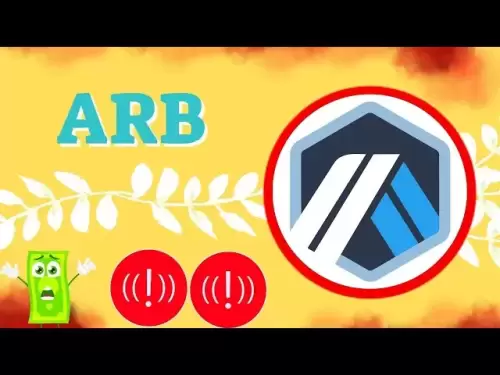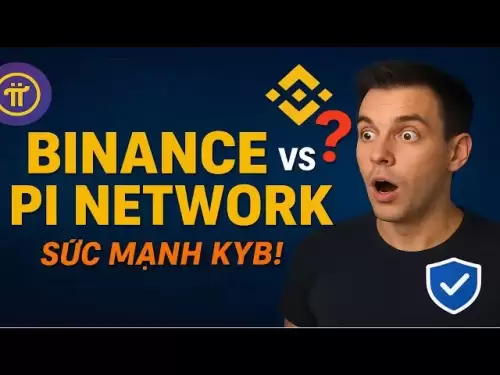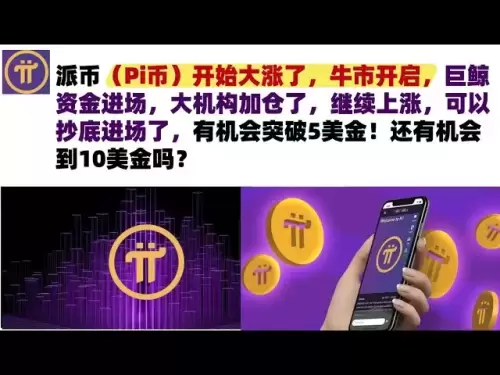-
 Bitcoin
Bitcoin $116900
0.00% -
 Ethereum
Ethereum $4280
5.48% -
 XRP
XRP $3.265
-1.45% -
 Tether USDt
Tether USDt $1.000
-0.01% -
 BNB
BNB $807.0
1.41% -
 Solana
Solana $183.1
2.93% -
 USDC
USDC $0.9999
0.00% -
 Dogecoin
Dogecoin $0.2440
6.50% -
 TRON
TRON $0.3357
-0.88% -
 Cardano
Cardano $0.8178
2.63% -
 Hyperliquid
Hyperliquid $44.13
7.45% -
 Chainlink
Chainlink $21.39
9.09% -
 Stellar
Stellar $0.4524
-0.84% -
 Sui
Sui $3.957
2.13% -
 Bitcoin Cash
Bitcoin Cash $572.7
-2.54% -
 Hedera
Hedera $0.2671
1.54% -
 Avalanche
Avalanche $24.77
4.17% -
 Ethena USDe
Ethena USDe $1.001
0.02% -
 Litecoin
Litecoin $122.3
-1.94% -
 Toncoin
Toncoin $3.432
2.26% -
 UNUS SED LEO
UNUS SED LEO $9.007
0.49% -
 Shiba Inu
Shiba Inu $0.00001396
5.26% -
 Uniswap
Uniswap $11.09
1.64% -
 Polkadot
Polkadot $4.155
4.57% -
 Dai
Dai $1.000
0.00% -
 Pepe
Pepe $0.00001253
5.11% -
 Cronos
Cronos $0.1588
2.67% -
 Bitget Token
Bitget Token $4.512
0.05% -
 Monero
Monero $275.0
0.64% -
 Ethena
Ethena $0.7527
15.10%
How to avoid high-price slippage when buying SOL?
To minimize slippage when buying SOL, use limit orders, break large orders into smaller ones, and choose high-liquidity exchanges to protect your investment.
Mar 27, 2025 at 10:15 pm
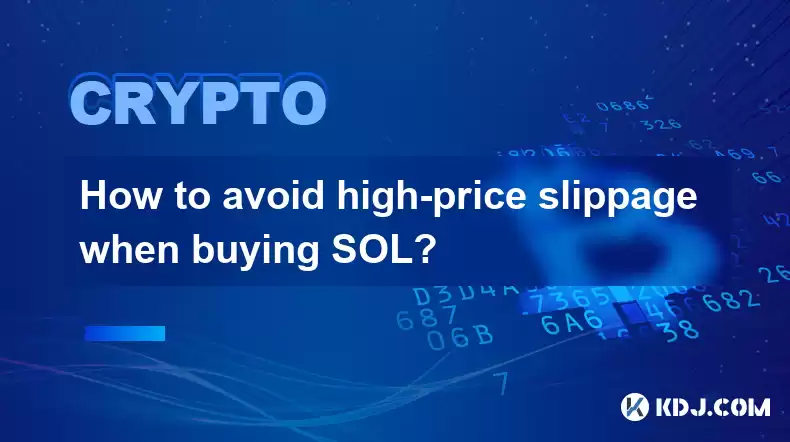
How to Avoid High-Price Slippage When Buying SOL
Understanding Slippage in Cryptocurrency Trading
Slippage refers to the difference between the expected price of a trade and the actual execution price. This is especially prevalent in volatile markets like cryptocurrencies. When buying Solana (SOL), a large order might significantly impact the order book, leading to a higher execution price than anticipated. This is because your buy order consumes available liquidity at the best price, forcing the rest of your order to execute at progressively worse prices. Minimizing slippage is crucial to protect your investment.
Factors Contributing to High SOL Slippage
Several factors can increase the likelihood of high slippage when purchasing SOL. Market Volatility is a major culprit. During periods of high price swings, even small delays can result in significant slippage. Order Size is another critical factor. Large buy orders consume more liquidity, increasing the chance of price movement and thus slippage. Trading Volume also plays a role; low volume exchanges are more susceptible to slippage as there's less liquidity available to absorb large orders. Finally, Trading Fees can indirectly contribute, as higher fees might encourage you to place larger orders to minimize the fee's impact per coin, increasing slippage risk.
Strategies to Minimize Slippage When Buying SOL
There are several strategies you can employ to mitigate the risk of high slippage when buying SOL. These strategies focus on optimizing your order placement and choosing the right exchange.
Use Limit Orders: Instead of market orders, which execute immediately at the best available price, limit orders allow you to specify a maximum price you're willing to pay. This ensures you won't overpay if the price suddenly jumps. This is the most effective way to avoid slippage.
Break Down Large Orders: Instead of placing one massive buy order, break it into smaller, more manageable orders. This reduces the impact on the order book and minimizes the price movement caused by your purchase. Stagger these orders over time.
Choose Exchanges with High Liquidity: Exchanges with high trading volume generally offer better liquidity, making it less likely that your order will significantly impact the price. Research and select exchanges known for their deep order books.
Use Advanced Order Types: Some exchanges offer advanced order types like "stop-limit" or "iceberg" orders. These orders can help you execute your trades more efficiently and reduce the risk of slippage. Familiarize yourself with these options.
Monitor Market Conditions: Before placing your order, carefully observe the market's volatility and trading volume. Avoid placing large orders during periods of high volatility or low liquidity. Be patient and time your purchases strategically.
Consider Using a Decentralized Exchange (DEX): DEXs often have lower fees and potentially better liquidity depending on the specific DEX and token pair. However, they may have other trade-offs, such as higher gas fees on certain blockchains.
Use Trading Bots (with caution): Algorithmic trading bots can help automate the process of breaking down large orders and executing them at optimal times. However, it's crucial to choose a reputable bot and understand the associated risks.
Understanding Different Order Types and Their Impact on Slippage
Market orders execute immediately at the best available price, but are most susceptible to slippage. Limit orders allow you to set a maximum price, offering protection against slippage but may not always execute if the price doesn't reach your limit. Stop-limit orders combine elements of both, executing only if the price reaches a certain level (stop price) and then at or below your specified limit price. Iceberg orders hide the total size of your order, revealing only a small portion at a time, reducing market impact and slippage.
The Role of Exchange Selection in Minimizing Slippage
The choice of cryptocurrency exchange significantly impacts slippage. Large, established exchanges with high trading volume generally offer better liquidity and lower slippage. However, even on these exchanges, large orders can still cause slippage. Always check the order book depth before placing a large order to assess the available liquidity. Consider using multiple exchanges to spread your risk and potentially find better prices.
Advanced Techniques for Minimizing Slippage
For more sophisticated traders, employing techniques like algorithmic trading or using sophisticated order management systems can further minimize slippage. These tools can analyze market conditions in real-time and execute trades optimally to minimize price impact. However, these techniques require a significant understanding of market dynamics and algorithmic trading principles. They are not suitable for beginner traders.
Frequently Asked Questions
Q: What is the best way to avoid slippage completely?
A: There's no foolproof method to completely avoid slippage, especially in volatile markets. However, using limit orders and breaking down large orders significantly reduces the risk.
Q: Are DEXs always better for avoiding slippage than centralized exchanges (CEXs)?
A: Not necessarily. While some DEXs offer high liquidity, others may have lower liquidity than certain CEXs, leading to higher slippage. It depends on the specific DEX and the trading pair.
Q: How does trading volume affect slippage?
A: High trading volume generally indicates high liquidity, reducing the likelihood of slippage. Low trading volume increases the risk of slippage, as large orders can significantly impact the price.
Q: What are the risks associated with using trading bots?
A: Trading bots can malfunction, leading to unexpected trades or losses. They can also be vulnerable to hacking or manipulation. Careful research and due diligence are crucial before using any trading bot.
Q: Can I completely eliminate slippage when buying SOL?
A: No, completely eliminating slippage is impossible. Market volatility and order size will always have some impact. The goal is to minimize slippage through careful order management and exchange selection.
Disclaimer:info@kdj.com
The information provided is not trading advice. kdj.com does not assume any responsibility for any investments made based on the information provided in this article. Cryptocurrencies are highly volatile and it is highly recommended that you invest with caution after thorough research!
If you believe that the content used on this website infringes your copyright, please contact us immediately (info@kdj.com) and we will delete it promptly.
- Trump, Nasdaq, and Token Treasury: WLFI's $1.5B Gambit
- 2025-08-10 06:50:12
- Trump, Nasdaq, and Token Treasury: WLFI's $1.5B Play
- 2025-08-10 06:30:11
- Bitcoin's Blazing 2025: YTD Performance and Total Return Breakdown
- 2025-08-10 07:10:12
- Coinbase, DEX Trading, and Base Network: A New Era for Crypto?
- 2025-08-10 06:30:11
- Dogecoin's Bullish Breakout: Riding the Fibonacci Waves to $1?
- 2025-08-10 07:10:12
- Block Inc., Bitcoin, and Mining Chips: Reshaping Digital Finance, New York Style
- 2025-08-10 06:50:12
Related knowledge

How to purchase Aragon (ANT)?
Aug 09,2025 at 11:56pm
Understanding Aragon (ANT) and Its PurposeAragon (ANT) is a decentralized governance token that powers the Aragon Network, a platform built on the Eth...

Where can I buy UMA (UMA)?
Aug 07,2025 at 06:42pm
Understanding UMA and Its Role in Decentralized FinanceUMA (Universal Market Access) is an Ethereum-based decentralized finance (DeFi) protocol design...

How to buy Storj (STORJ) tokens?
Aug 09,2025 at 07:28am
Understanding Storj (STORJ) and Its Role in Decentralized StorageStorj is a decentralized cloud storage platform that leverages blockchain technology ...

What is the best app to buy Nano (NANO)?
Aug 09,2025 at 03:35am
Understanding Nano (NANO) and Its Unique FeaturesNano is a feeless, instant cryptocurrency designed for fast peer-to-peer transactions. Unlike many ot...

Where can I purchase Siacoin (SC)?
Aug 08,2025 at 11:14am
Understanding Siacoin (SC) and Its Role in the Sia NetworkSiacoin (SC) is the native cryptocurrency of the Sia decentralized cloud storage platform, a...
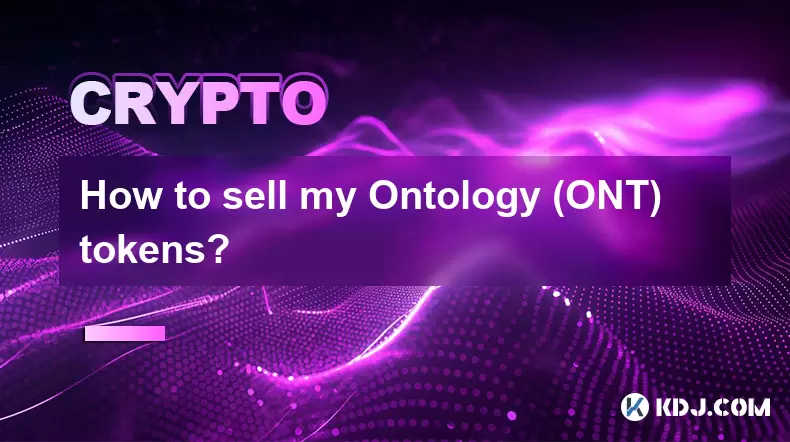
How to sell my Ontology (ONT) tokens?
Aug 09,2025 at 06:08pm
Understanding Ontology (ONT) and Its Trading EcosystemBefore selling your Ontology (ONT) tokens, it's essential to understand the nature of the crypto...

How to purchase Aragon (ANT)?
Aug 09,2025 at 11:56pm
Understanding Aragon (ANT) and Its PurposeAragon (ANT) is a decentralized governance token that powers the Aragon Network, a platform built on the Eth...

Where can I buy UMA (UMA)?
Aug 07,2025 at 06:42pm
Understanding UMA and Its Role in Decentralized FinanceUMA (Universal Market Access) is an Ethereum-based decentralized finance (DeFi) protocol design...

How to buy Storj (STORJ) tokens?
Aug 09,2025 at 07:28am
Understanding Storj (STORJ) and Its Role in Decentralized StorageStorj is a decentralized cloud storage platform that leverages blockchain technology ...

What is the best app to buy Nano (NANO)?
Aug 09,2025 at 03:35am
Understanding Nano (NANO) and Its Unique FeaturesNano is a feeless, instant cryptocurrency designed for fast peer-to-peer transactions. Unlike many ot...

Where can I purchase Siacoin (SC)?
Aug 08,2025 at 11:14am
Understanding Siacoin (SC) and Its Role in the Sia NetworkSiacoin (SC) is the native cryptocurrency of the Sia decentralized cloud storage platform, a...

How to sell my Ontology (ONT) tokens?
Aug 09,2025 at 06:08pm
Understanding Ontology (ONT) and Its Trading EcosystemBefore selling your Ontology (ONT) tokens, it's essential to understand the nature of the crypto...
See all articles





















